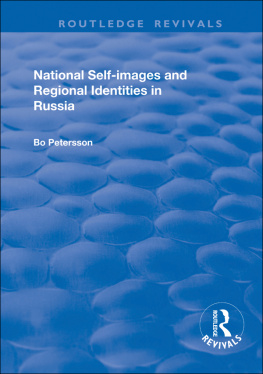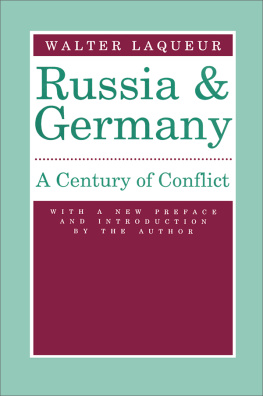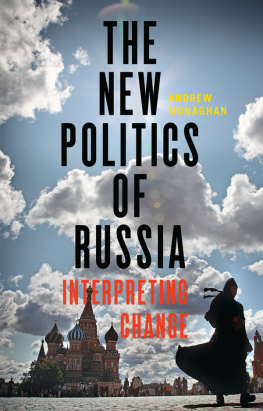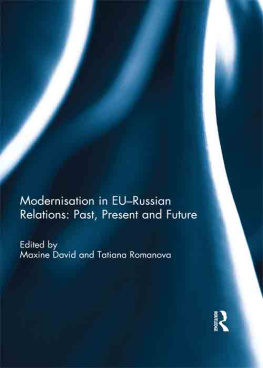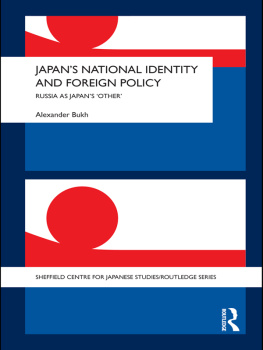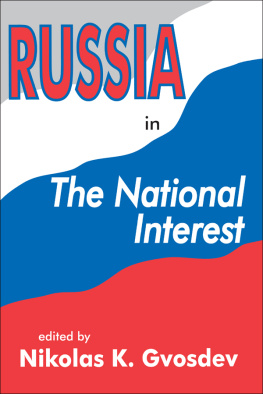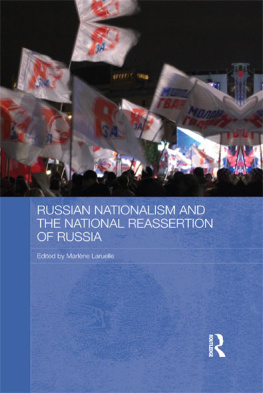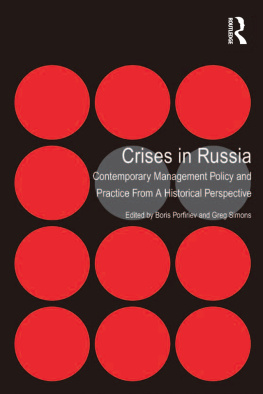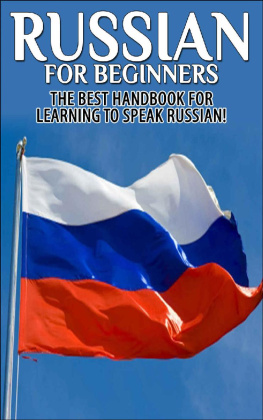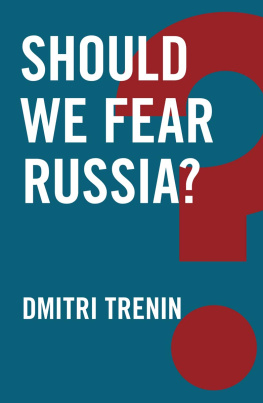RUSSIAN NATIONAL INTERESTS AND THE CURRENT CRISIS IN RUSSIA
To the staff of main reading halls
of the Library of Congress
an extremely helpful and friendly
bunch of professionals
First published 1999 by Ashgate Publishing
Reissued 2018 by Routledge
2 Park Square, Milton Park, Abingdon, Oxon, OX14 4RN
711 Third Avenue, New York, NY 10017, USA
Routledge is an imprint of the Taylor & Francis Group, an informa business
Copyright Henry Trofimenko 1999
All rights reserved. No part of this book may be reprinted or reproduced or utilised in any form or by any electronic, mechanical, or other means, now known or hereafter invented, including photocopying and recording, or in any information storage or retrieval system, without permission in writing from the publishers.
Notice:
Product or corporate names may be trademarks or registered trademarks, and are used only for identification and explanation without intent to infringe.
Publishers Note
The publisher has gone to great lengths to ensure the quality of this reprint but points out that some imperfections in the original copies may be apparent.
Disclaimer
The publisher has made every effort to trace copyright holders and welcomes correspondence from those they have been unable to contact.
A Library of Congress record exists under LC control number: 98008637
ISBN 13: 978-1-138-35236-0 (hbk)
ISBN 13: 978-0-429-43480-8 (ebk)
This study was prepared with the help of a grant from the United States Institute of Peace during the period 1993/98.
The main difficulty in researching the topic Russian national interests was identifying the real national interests of Russia, as they are understood and formulated by a small sector of the current Russian elite, when it thinks about this problem, and then separating national interests from the well intentioned declarations of various Russian officials, which are designed essentially for foreign consumption.
Another difficulty is the volatile nature of Russian politics at the present time. It is the politics of a state in transition and there are very few more or less stable variables to guide the researcher. I shall address this issue in the Introduction.
I want to express my sincere gratitude to the management of the United States Institute of Peace and personally to its President Dr. Richard Solomon, Vice President Dr. Charles Nelson, Director of the Grant Program Dr. David Smock, Director of Education and Training Program Hrach Gregorian and Grant Administrator April Hall for all the help they gave me in the process of my work.
I also want to express my heartfelt thanks to the member of the Board of the USIP, my old friend, Dr. William Kintner, who recently passed away. His pertinent advice and guidance, based on his tremendous experience, were very valuable for my research.
Dr. Joseph Churba - the President of the International Security Council in Washington, D.C. - the institution that sheltered me for a year, was very generous with his time, often engaging me in a debate that broadened my horizons whilst trying to understand complex international situations. The Senior Vice President of the ISC, William Mazzocco, and Administrative assistant Mary Frye, were always ready to give me much needed aid and to cheer me up during certain gloomy moments.
I am also indebted to my good friends - Mrs. Janet Willen of New York, Dr. Jim Moncure and Mrs. Jane Moncure of Seven Lakes West in North Carolina, who invariably encouraged and supported me in my work.
My deep gratitude goes to the Ashgate Publishing House and its consulting editor, John Irwin, who made the appearance of this book possible. Two wonderful ladies from Ashgate Mrs. Valerie Saunders and Miss Kirstin Howgate became my guardian angels during the preparations of this book for printing and my appreciation of their help is boundless. My sincere heartfelt thanks go to Dr. Christopher Williams, Reader in Russian studies at the University of Central Lancashire, who opened a green light to my manuscript. Dr. Williams gave me a lot of constructive advice about how to improve my earlier draft and was very helpful in making my English more readable.
Finally my thanks go to my son Sergey, who rendered me a lot of technical assistance, and to my dear wife Tamara, who created for me excellent conditions for work and rest, and who was very instrumental in obtaining some out of print Russian books as well as obscure memoranda from various offices in Russia.
I should add that the opinions, findings, and conclusions, expressed in this book, are those of the author and do not necessarily reflect the views of the Russian government, the United States Institute of Peace, the International Security Council in Washington, D.C., or the Institute for the US and Canada Studies in Moscow, where the author is presently employed.
August 1998,
Moscow, Russia.
My choice of the subject of Russian national interests for this study was not accidental. For a long time, I have considered the fate of the new Russia. The course of present reforms in Russia illustrate that the pivotal problem for the new Russias domestic and foreign policy is the necessity for a clear definition of the final goals of our social and economic reforms and of political and military strategy from the point of view of Russias interests as a whole, from the position of its peoples objective aspirations. The key question is: Where is Russia going?. This question has occupied the thoughts and minds of the cultural strata of Russian society, and has been the subject of great debate among grand dukes and Tsars, communist commissars and now - to somewhat lesser extent - this issue is a matter of concern for the so-called democrats. Such non-stop public philosophical musings about Russias future and the destiny of its people is probably a particular feature of a Russian mind.
Naturally, in every country there are occasional public debates on the means and directions of its development, but only in a very few cases are these issues the subject of heated debate, this is the case in Russia. This is reflected in Russian literature dating from the first chroniclers of Russian history - the Orthodox monks of Kievan Rus - and ending with such world famous authors as Peter Chaadayev, Alexander Herzen, Nikolay Gogol, Leo Tolstoy, Fyodor Dostoyevsky, Vladimir Solovyov, Nikolay Berdyaev, Alexander Solzhenitsyn and a great martyr of the Soviet society Andrei Sakharov.
The answer to the questionwhere is a particular country goingboils down to a proper definition of its national interests. In todays Russia they are not well defined, if at all. But with every political turn, with every major measure undertaken - be it diplomatic activity on some foreign policy issue, the problem of export-import balancing, or the working out of the basic tenets of Russian national security policy - the inevitable first question that is being asked is: what is Russian national interest in this field?. The Russian media also points to the lack of coherent national security and economic policies, the inadequacy of the present Russian military doctrine and the wavering nature of Russian foreign policy, as shown by the absence of a clear cut understanding of the Russian national interests on the part of the Russian leadership. Of course, the problem lies not only in the need for a more or less coherent, even if not altogether comprehensive, definition of the basic national interests of Russia. Closely linked to this problem is the choice of priorities in pursuing various interests and the assessment of available resources - human, financial, industrial etc. - needed to realize them.



